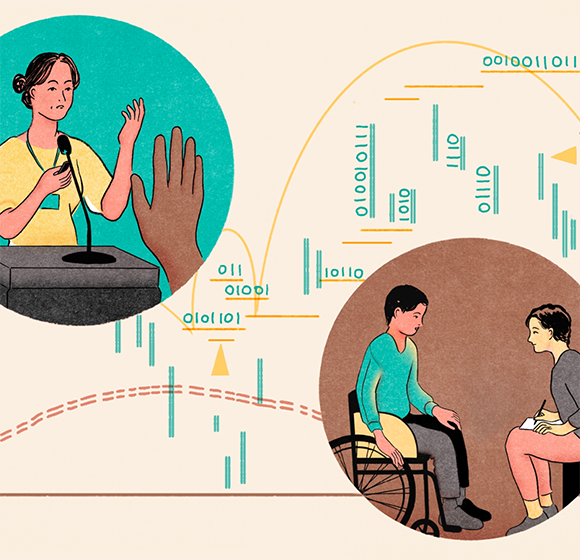May 10, 2023 — New York, NY — Data & Society (D&S) today announced the launch of its Algorithmic Impact Methods Lab (AIMLab), which will develop robust public interest methodologies to evaluate how increasingly ubiquitous automated decision-making systems impact people’s lives and society at large. We know these systems have enormous consequences, yet there is no way to measure their impact, and with it, to hold those who built them accountable for harm. Through collaborative, experimental work, AIMLab will demonstrate not only that measuring these impacts is possible, but show how it can be done in the public interest — and indeed, why it must.
While impact assessments are well-established in other fields, including environmental protection, fiscal review, and human rights, they are only now emerging as a tool for algorithmic systems. As they do, it is crucial that Big Tech not be permitted to set the terms or create the methodologies by which their own systems will be evaluated. The National Telecommunications and Information Administration’s recent call for public input on AI accountability methods like audits and impact assessments points to the need for independent mechanisms by which to assure the public that an AI system is trustworthy. By foregrounding the communities that are most impacted by algorithmic harms, AIMLab aims to devise empirically grounded assessment methods that serve the public interest, and to make them readily accessible and widely available.
“Our lives are increasingly mediated by algorithmic systems that are largely out of our control, with automated decisions impacting us in ways that are too often rendered invisible,” said Jacob Metcalf, director of Data & Society’s AI on the Ground program. “The people for whom these systems are potentially the most harmful — those who are historically vulnerable to social and economic inequity, and who are often already subject to multiple forms of arbitrary exclusion, coercion, and surveillance — have had the least power to shape them. We urgently need ways to reliably measure those consequences beyond their technical boundaries. In developing approaches to impact assessment that are up to that task, AIMLab will work to rebalance power dynamics between the companies who build automated technologies and the people who use and are affected by them.”
“The impacts of algorithmic systems have gone unchecked for too long,” said Janet Haven, executive director of Data & Society. “To address the harmful consequences of these systems — both existing and potential — we need to measure and understand exactly what they do. We need to work collaboratively and think creatively. And progress in this area simply won’t be possible unless we meaningfully integrate the perspectives of the people and communities for whom these systems are most consequential. That understanding is central to AIMLab’s work.”
AIMLab’s core activity will be developing, piloting, and promulgating impact assessment methods. The project’s primary purpose is not to publish impact assessments themselves, but to work collaboratively with diverse partners with varied expertise to show how it can be done in a way that foregrounds the public interest. Impact assessments don’t by themselves provide more democratic accountability for the systems being assessed; they don’t automatically prevent harm, or consider every possible outcome of a system. What they can do is provide transparent documentation of potential consequences, which can be used as a starting point for debate. AIMLab will help Data & Society, our partners, and society to understand the terms and stakes of that debate.
We are in the process of expanding our team to meet these ambitions. This project will also require sustained engagement with advocacy and community groups, technology firms, regulators, and academic and civil society researchers. D&S is actively seeking potential partners with mutually aligned interests or research practices. If you are interested in collaborating, get in touch: [email protected].
The Algorithmic Impact Methods Lab has been generously supported in part by the Open Society Foundations and the Siegel Family Endowment through their Fellows Program.


